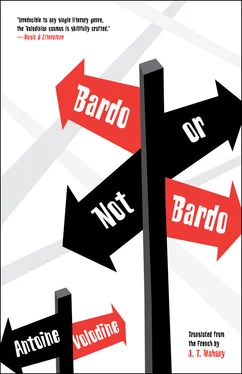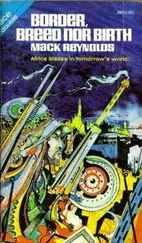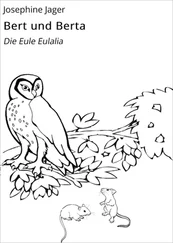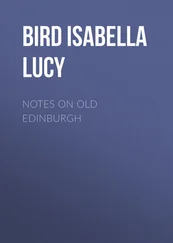The clown gesticulates. He spins around, stretching out his arms, like a shaman on the brink of a trance, though it is obvious he hardly believes in the spectacle’s worth. On top of that, his gestures are uncertain. With the back of the hand, he slaps the platter Yasar had used to serve his whiskies. The glasses go flying, a saucer rolls off, everything shatters on the ground.
“Oh, blasted yak rot! I broke your dishes,” he says, doubtlessly relieved to have found a pretext for taking a break.
“It’s nothing,” says Yasar. “I’ll clean it up. Don’t stop.”
“You are having difficulty deciphering the universe which has welcomed you,” continues the lama. “You understand nothing. Nothing is familiar to you. Without an effort on your part, you are going to be as ill-equipped to interpret the post-death world as a baby in the post-birth world. React, noble son. Do not let yourself become submerged in dread. Do not imagine either that you are finally walking into reality. Everything around you is just another illusion. Do not become attached to this illusion, as deceitful and vain as the existence you just left.”
“You’re acting like Big Grümscher was attached to this existence,” Blumschi remarks.
He picks up a piece of glass from the ground. Tears run down his cheeks.
“Leave it,” says Yasar.
Blumschi gets back up. He didn’t even have time to cut his palm. He is standing in the small puddle, surrounded by nearly-melted ice cubes, alive, not even wounded. He is comical. No one feels like laughing.
“Do not become at all attached to it,” says the lama.
“Is Big Grümscher still listening?” Little Blumschi suddenly continues. “Does he hear Mister Lama, huh? Is he listening to Mister Lama? Is he not letting himself become submerged in dread? Is floating in vultures’ gastric juices not doing anything for him? Oh, but I heard that the Grümscher is a little afraid. . Don’t be afraid, you big straw mat! It’s for a laugh! It’s just an unreal world! It’s a silly illusion! You have to get used to it, Big Grümscher! Don’t get attached!”
Sobs suffocate Little Blumschi. A truck passes by. The windows tremble. Blumschi has slumped into a chair to cry.
“I can’t,” says the clown. “It’s too absurd. It’s making everyone suffer.”
“Don’t stop, Blumschi,” says Freek. “Don’t cry too loudly. You don’t want him to hear you crying. Keep helping him like you were. The big one’s afraid. He’s woken up and is afraid. It does him an enormous good to hear you. Don’t stop shouting your inanities. I’m sure it’s doing him an enormous good.”
“Who cares about my inanities?” says Blumschi. “He can’t hear me.”
Blumschi sniffles. He sits up straight in his chair. He listens to the religious man’s voice describing the best attitudes for the dead man to adopt should any problems arise, but now the discourse is in a ritual Tibetan which the least useful intonation no one in the bar can glean.
“You never know,” says Freek. “But maybe, down there, in the dark, he understood. He wanted to laugh in the dark. Maybe. He was afraid, then he was less afraid.”
“Poor guy,” says Blumschi. “He didn’t laugh for months at a time. He was drowning in depression and couldn’t get out. Nobody found us funny anymore. Big Grümscher was a great clown though. I’m not saying that just to indulge him, or because I loved him like a brother. I’m saying it because it’s true. He was a consummate professional. But we still couldn’t get any laughs from the bleachers anymore. Sympathetic murmurs, yes, two or three snickers, but no laughs. Big Grümscher started to feel like it was too much, in the circus, in life. He felt completely useless. Nothing helped convince him to the contrary. In the last few days he was dwelling down there for good. He was convinced he was lost in an awful dream.”
Yasar sweeps the glass fragments, the ice cubes. He makes the puddle disappear. He thinks about Blumschi, about Grümscher, about Freek. He recalls the years in captivity, he reflects on the strange pointlessness of existence, no matter what anyone wants. He rinses the ground under the table, he takes the mop near the counter. We all feel like we are lost inside an awful dream, and, if you add together all the insignificant moments of the present, the dream carries on.
“You know,” Blumschi says, “when a clown can’t make anyone laugh, he can go mad with grief. You go onstage, the projectors blind you, it’s freezing cold, the circus reeks of old beasts, the smell of piss rises from the sand, and you’re there, to thrash around, to shout, like you’re extremely lonely, with the hope that, despite everything, someone on the bleachers will soon start laughing, in the darkness you can hardly see because of the lamps. But no one flinches. No one giggles or roars. And it’s unbearable. It drives you mad. Years like that, living it night after night. Waiting for laughs that never come.”
“You made me laugh,” says Freek. “I went to see you at the Schmühl Circus. I saw both of you. The kings of laughter, like on the poster. I was in the dark, on the bleachers. The third row. There were some children. They had stopped talking. The closest ones were annoyed that I was sitting next to them. They tried to move away. I didn’t dare laugh out loud once I realized that I was the only one who found you funny. But I had a stomachache. You made me laugh. I don’t think I’ve ever laughed so much in my life.”
“Yes, but with you, it’s not the same,” says Blumschi. “You’re not really. . I mean. .”
Freek jabs his nose into his bowl of caffeine. He still had the bottom to finish.
“Each one of us is mired in his own awful dream,” the clown says. “You’re there, petrified with grief on top of the stinking sand, and, as petrified as you are, you keep struggling, emitting sounds. . You wait for a friendly laugh to echo from the dark. You wait for a friendly voice to encourage you, agree with you, pull you from there. . And nothing. Nothing comes. . The darkness remains silent. You do the best clownings in your repertoire, and the children move away. No bursts of laughter. . So you don’t even believe in friendship anymore. You move away yourself. You close up. You don’t even try sharing your grief with Little Blumschi. You go hang around under the acrobats’ crossbar one night. You go hang around under the acrobats’ crossbar one night, and you hang yourself.”
Blumschi is once again slumped in his chair. He spoke those last sentences in a broken voice. Mucus and tears soil his cheeks. Yasar rinsed the mop in the bucket, then he washed Freek’s bowl, some saucers, a spoon. At one point, he closed the air vent connected to the temple. The reading of the Bardo Thödol became a distant, uninterpretable murmur. Grümscher can perhaps be heard better right now in his mysterious darkness, but the lama’s guidance is unintelligible.
A police car races down the boulevard. The revolving lights color a wall red and blue for a second. The windows quiver.
Freek has left for the zoo.
Yasar turns the radio back on. It’s the Korean music program again. For those in the know, it is now a traditional dance, accompanied by a popular oboist, the hyangpiri , an hourglass-shaped drum, the changgo , a cylindrical drum, the puk , and flutes. For others, it’s just lovely music that can be listened to for hours, because it’s rhythmic, because it’s beautiful, and because they are extremely lonely.
Antoine Volodine is the primary pseudonym of a French writer who has published twenty books under this name, several of which are available in English translation, including Post-Exoticism in Ten Lessons, Lesson Eleven (also available from Open Letter) and Minor Angels . He also publishes under the names Lutz Bassmann ( We Monks & Soldiers ) and Manuela Draeger ( In the Time of the Blue Ball ). Most of his works take place in a post-apocalyptic world where members of the “post-exoticism” writing movement have all been arrested as subversive elements. Together, these works constitute one of the most inventive, ambitious projects of contemporary writing.
Читать дальше












